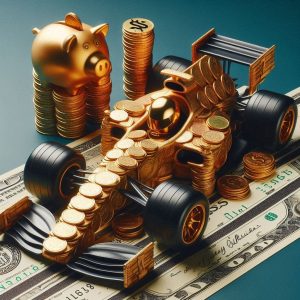Norris Stepping Aside for Piastri in F1 2024
Norris Stepping Aside for Piastri – A Question of Sportsmanship or Morality?
In the high-octane world of Formula 1, every decision can have far-reaching consequences. A recent incident involving McLaren drivers Lando Norris and Oscar Piastri at the Hungarian Grand Prix has sparked a debate about sportsmanship, team dynamics, and moral values in sports. Is Norris Stepping Aside for Piastri in F1 acceptable?
The Incident Of Norris Stepping Aside
During the race, Norris, who was leading, was asked by his team to step aside and let Piastri, his teammate, pass him. This decision was part of a strategic move by McLaren to gain an advantage over their competitors. Norris steeping aside & complying with the team’s orders, allowing Piastri to take the lead and eventually win the race.
Sportsmanship or Poor Morality?
The Norris stepping aside incident has raised questions about whether Norris stepping aside for Piastri was an act of good sportsmanship or a reflection of poor moral values by the team. On one hand, some argue that Norris demonstrated excellent sportsmanship by putting the team’s interests above his own. They believe that such selfless acts are part of what makes sports so compelling and inspiring.
On the other hand, critics argue that the team’s decision undermines the spirit of competition. They believe that each driver should have the opportunity to compete fairly and that team orders can compromise the integrity of the sport.
Acceptability in Sports
The question of whether such tactics should be acceptable in sports is a complex one. In team sports, it’s common for players to sacrifice personal glory for the good of the team. However, in individual sports like F1, where drivers compete against each other while also representing their teams, the line between teamwork and fair competition can become blurred.

A Recurring Theme in F1
—————————
Team Orders
Team orders, such as the one involving Norris and Piastri, have been a part of Formula 1 for decades. In the early years of the sport, it was even legal for a driver to give up his car during the race to the team leader if the latter’s car had broken down. Over the years, there have been numerous instances where drivers were asked to step aside for their teammates.
The rationale behind team orders is that they are a strategic move designed to maximize the team’s chances of winning the championship. Teams argue that Formula 1 is a team sport, and therefore, they are entitled to ask their employees (the drivers) to do whatever they wish to secure the best possible result for the team.
The Fans’ Perspective
The use of team orders in Formula 1 has always been a contentious issue among fans. Some fans argue that team orders are an integral part of the sport, adding an extra layer of strategy and intrigue to the races. They appreciate the tactical aspect of the sport and understand that sometimes, individual sacrifices are necessary for the greater good of the team.
However, there is also a significant portion of the fanbase that views team orders as a distortion of the sport’s competitive nature. These fans believe that races should be won on the track, not through team strategies. They argue that team orders can rob fans of the chance to see real, head-to-head racing between the world’s best drivers.
Whether team orders are good or bad for fans largely depends on one’s perspective. What is clear, however, is that they continue to be a hotly debated topic in the world of Formula 1. As long as there are teams and championships at stake, it’s likely that team orders will remain a part of the sport. The challenge for Formula 1’s governing body is to find a balance that maintains the integrity of the competition while also acknowledging the team-based nature of the sport.

Long-Term Implications and F1’s Stance
The use of team orders in Formula 1 is not just a matter of immediate race outcomes; it also has long-term implications for the sport, the teams, and the drivers. The question is, does Formula 1 actually care about these implications, or are team orders simply accepted as part of the sport?
Formula 1, as a sport, is a complex ecosystem of competing interests. On one hand, there are the teams, who are primarily interested in winning championships and securing the best possible results for their organization. On the other hand, there are the drivers, who are fiercely competitive individuals striving for personal glory.
Team orders can create tension within this ecosystem. They can lead to dissatisfaction among drivers, who may feel that they are not being given a fair chance to compete. They can also lead to controversy among fans, who may feel that team orders distort the competitive nature of the sport.
Despite these potential issues, team orders have been allowed in Formula 1 for many years. The sport’s governing body, the FIA, has occasionally intervened to regulate the use of team orders, but they have generally been accepted as a legitimate part of team strategy.
From a long-term perspective, the use of team orders can have significant implications. They can influence the dynamics within a team, affecting relationships between drivers and their perception among fans. They can also impact the overall competitiveness of the sport, potentially leading to predictable race outcomes.
However, it’s important to note that Formula 1 is a team sport as much as it is an individual sport. Teams invest significant resources into developing their cars and strategies, and they have a legitimate interest in maximizing their chances of success. From this perspective, team orders can be seen as a necessary part of the sport.
Formula 1 does care about the long-term implications of team orders, it also recognizes them as a part of the sport. The challenge for the sport’s governing body is to ensure that team orders are used in a way that maintains the competitive integrity of the sport, while also respecting the interests of the teams. This is a delicate balance to strike, and it’s a topic that will likely continue to generate debate in the world of Formula 1.

F1
Formula 1, like many professional sports, operates at the intersection of sport and business. The teams are not only competing for glory on the track, but they are also businesses that need to generate revenue and provide value to their stakeholders.
F1’s Business Interests
Over the years, Formula 1 has grown into a global brand with a significant commercial footprint. The sport generates revenue through various channels, including broadcasting rights, sponsorship deals, and race hosting fees. The teams, too, operate as businesses, with budgets running into hundreds of millions of dollars. They rely on a mix of prize money, sponsorship deals, and other commercial partnerships to fund their operations.
There is evidence that Formula 1 has made strategic decisions with a view to maximizing its commercial appeal. For example, the sport has expanded into new markets and embraced digital media to increase its global audience and attract more sponsors. The introduction of the ‘Drive to Survive’ series on Netflix and the focus on Esports are examples of how Formula 1 has leveraged digital platforms to engage with a younger, more diverse audience.
Balancing Business and Sport
However, the commercial interests of Formula 1 and its teams do not always align with the sporting aspects of the competition. Decisions made with a view to maximizing revenue, such as the introduction of new races in lucrative markets, can sometimes be at odds with the sporting integrity of the competition.
The use of team orders is a prime example of this tension. While such tactics may make sense from a business perspective, as they can help a team secure the best possible result and maximize its share of the prize money, they can also be seen as compromising the sporting nature of the competition.
F1 Teams
Formula 1 teams operate in a unique environment where they must balance their roles as competitive sports entities and as businesses. This balance is often delicate, as the interests of the sport and the business can sometimes conflict.
The Business Side of F1 Teams
F1 teams are businesses that need to generate revenue to sustain their operations. They rely on a mix of income sources, including sponsorship deals, prize money, and commercial partnerships. The teams also invest heavily in technology and human resources to stay competitive on the track. This investment often runs into hundreds of millions of dollars, underlining the significant financial stakes involved in the sport.
In recent years, F1 teams have made strategic decisions to maximize their commercial appeal. For example, they have embraced digital media to increase their global audience and attract more sponsors. The introduction of the ‘Drive to Survive’ series on Netflix and the focus on Esports are examples of how F1 teams have leveraged digital platforms to engage with a younger, more diverse audience.

The Sporting Side of F1 Teams
Despite their commercial interests, F1 teams are first and foremost competitive sports entities. They exist to compete and win races. The drivers, engineers, and support staff who make up the teams are all driven by a passion for the sport and a desire to succeed on the track.
However, the commercial interests of the teams can sometimes conflict with the sporting aspects of Formula 1. For example, team orders, where a team instructs one driver to let another pass, can be seen as a business decision designed to maximize the team’s chances of winning the championship. However, such tactics can also be seen as compromising the sporting integrity of Formula 1.
Conclusion
The incident involving Norris stepping aside and Piastri raises important questions about sportsmanship, morality, and the nature of competition in sports.
It’s a reminder that sports, at their best, are not just about winning, but also about how we play the game.
F1 teams operate in a complex environment where they must balance their sporting objectives with their commercial interests.
While there is no doubt that business considerations play a significant role in the decisions made by the teams, it is also clear that they care deeply about the sporting integrity of Formula 1.
The challenge is complicated as it lies in striking the right balance between these two aspects. This is a delicate balance to strike, and it’s a topic that will likely continue to generate debate in the world of Formula 1.
Both Formula 1 and its teams operate in a complex environment where they need to balance their sporting objectives with their commercial interests.
While there is no doubt that business considerations play a significant role in the decisions made by both the sport’s governing body and the teams, it is also clear that they care deeply about the sporting integrity of the competition.
Join the Discussion
We invite you to join the discussion on this complex and fascinating topic of Norris stepping aside.
Sportsmanship vs Business Interests – Do you think team orders, like the one involving Norris and Piastri, undermine the spirit of competition in F1, or are they a necessary part of the sport?
Fan Experience – How do team orders impact your experience as a fan? Do they add an extra layer of strategy and intrigue to the races, or do they rob fans of the chance to see real, head-to-head racing?
Long-Term Implications – What do you think are the long-term implications of team orders for the sport, the teams, and the drivers?
Balancing Act – How can Formula 1 strike the right balance between maintaining the competitive integrity of the sport and acknowledging the commercial interests of the teams?
We look forward to hearing your thoughts and opinions on these matters. Remember, the beauty of sports lies not only in the thrill of the race but also in the conversations and debates it sparks among its fans. So, let’s get the discussion started!
#F1 #Formula1 #McLaren #TeamOrders #Sportsmanship #Morality #BusinessOfF1 #F1Teams #F1Racing #GrandPrix #HungarianGP #F1Fans #F1Debate #DriveToSurvive #F1Strategy #F1Controversy #F1Discussion #F1SportVsBusiness #F1Integrity #F1Competition #F1Championship #F1Drivers #F1Experience #F1Implications #F1Balance #F1Future #JoinTheDiscussion #F1Community #F12024







Thanks for another fantastic article. Where else could anybody get that type of information in such an ideal way of writing? I’ve a presentation next week, and I’m on the look for such info.
Well I really liked reading it. This article procured by you is very practical for good planning.
I?¦ll immediately clutch your rss as I can’t in finding your e-mail subscription link or e-newsletter service. Do you’ve any? Please allow me recognize in order that I could subscribe. Thanks.
Great tremendous issues here. I?¦m very happy to look your article. Thanks so much and i’m having a look ahead to contact you. Will you please drop me a e-mail?